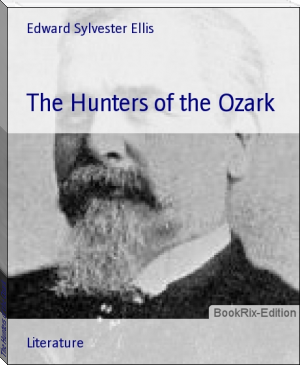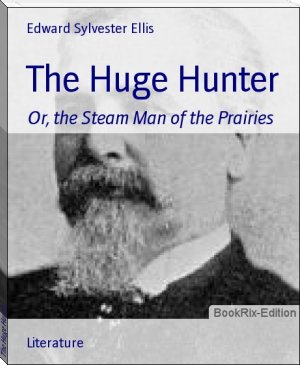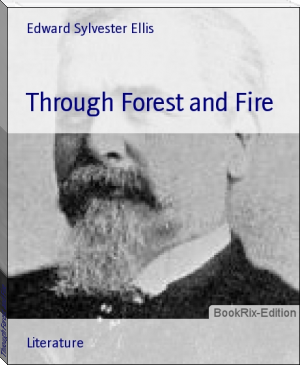The Hunters of the Ozark - Edward Sylvester Ellis (children's ebooks online .txt) 📗

- Author: Edward Sylvester Ellis
Book online «The Hunters of the Ozark - Edward Sylvester Ellis (children's ebooks online .txt) 📗». Author Edward Sylvester Ellis
him; then, do ye not mind that the men may take it into their heads to run away."
"They have their horses," said Fred, foreseeing and agreeing with the response that his young friend would make.
"Not one of 'em is worth a cint at such a time; a one-legged Indian could outrun the fastest; they would have to stick fast to the trail while the spalpeens would walk all around 'em."
"All that is true, but if they could get a good start, it would be very handy for Mr. Bowlby to have one of the horses to ride."
"I don't see much chance of the same," was the sensible comment of Terry; "but, me boy, have ye any idaa of what time it is?"
"It must be far beyond midnight: surely we are a long ways in advance of the Winnebago camp where we left Deerfoot."
"They are not meaning to make a start to-night?"
"Of course not; they will not move until morning."
"Thin I'm in favor of an adjournment _sine die_, at once and without waitin' any longer."
"What do you mean?" asked the puzzled Fred, stopping and looking around at his companion.
"I'm tired out."
"So am I, but I made up my mind to keep walking till I dropped, before I would give in to you. It will be a sensible thing for us to rest, but we must get far enough from the trail, so that if any more stragglers come along this way, they won't stumble over us."
This was only simple prudence. They groped along for several rods, through the undergrowth and among the limbs, and were still walking, when Terry's foot struck some obstruction and he fell flat.
"Are you hurt?" asked Fred.
"Hurt? No; that's the way I always lay down, as me uncle obsarved whin he fell off the roof--call me early, Fred, and be sure ye don't take up more of the bed--than--a--gintleman----"
The poor wearied fellow was asleep.
Fred smiled, as he lay down beside him The air was quite brisk, so he unstrapped his blanket and flung part of it over his friend and the rest over himself, the two lying back to back as they lay the night before in the cavern. The dried leaves made as soft a couch as they could want and Fred had only time to murmur a prayer to heaven, when he too became unconscious.
They slumbered for four full hours, when both awoke at the same moment, refreshed and strengthened. The sun was well up in the sky, and fortunately the weather continued clear, crisp and bracing. Indeed it could not have been more nearly perfect.
They laughed when they saw where they had made their bed, right in the open wood, just as any wild animal would have done when overcome by fatigue. There was no water within sight and no food at command. The blanket was quickly folded up into a neat parcel and strapped to the back of Fred and the two retraced their steps to the trail, which they hoped to follow until it took them to the camp at the foot of the Ozarks.
"I have found out one thing, that have I," remarked Terry, with the air of one announcing a great discovery.
"What is that?"
"The hungriest young gintleman on the western side of the Mississippi is the handsome youth whom ye have the honor of walkin' with this very minute."
"I can feel for you on _that_ question," added Fred; "for it seems to me that I never wanted food so bad in all my life; we must be on the lookout for game. Do you know how to make that call that Deerfoot used to bring the turkey to him?"
"No, but I know how to use the turkey after the same is brought to me. If I should try the signal, it would scare all the turkeys and deer and foxes and bears and wolves and beavers out of the country, which bein' the same, I won't try it, principally because I don't know how to begin to try it."
"My gracious, Terry; if you could shoot like you can talk, we wouldn't have to wait long for something to eat."
"Whisht, Fred," whispered Terry, in some excitement; "the wood just beyanst ye looks as if it wasn't any wood at all."
Fred Linden had noticed the peculiarity. The trees were becoming so scarce and far apart that it was evident they were approaching some extensive clearing where no trees grew at all. The next minute the two stood on the edge of an immense prairie, which revealed a sight that profoundly interested them.
CHAPTER XXVII.
A MORNING MEAL.
The two boys stood on the edge of a prairie which had a varying width of from one to three miles. Looking to the right and the left, neither end could be seen, so that there was no means of judging its length.
The trail led straight across to the wilderness on the other side, which at that point was all of two miles distant. You can understand that walking was so much easier on the open ground that any party of travelers would hasten to take advantage of such a chance. The hoofs of the half dozen horses had left such a distinct impression that the eye could follow the trail a long ways from the margin of the woods.
This prairie was entirely covered with a growth of succulent grass. The season was so late that it had lost most of its verdancy, but there was an abundance of nutriment in the blades and it was splendid feeding-ground--one of those breaks in the almost limitless forest of which grazing animals were sure to take advantage.
The boys had paused only a minute or two, gazing out on the almost level expanse, when Terry uttered an exclamation of delight and pointed to the right. Looking in that direction (as Fred had done at the moment his companion spoke), he saw a welcome sight indeed. A herd of buffaloes were cropping the grass within gunshot of the young hunters.
As I have said in another place, there were no such droves as have sometimes been seen on the vast prairies of the far west, numbering fully a hundred thousand, though a century ago some amazing collections of animals were met within sight of the Mississippi.
The herd upon which our friends looked with so much interest numbered little more than a hundred, and they were ruminating along the side of the prairie instead of cropping the grass in the middle of the plain. Some of them seemed to be browsing among the trees and undergrowth, but the major part were scattered over the prairie to a distance of two hundred yards, while they were strung to a still greater extent parallel with the course of the prairie itself. From this you will see they were much dispersed, none of them being close to another, except he may have brushed against him now and then.
The front of the drove was not less than two hundred feet away and others could be heard ruminating among the trees, where their huge bushy heads and big round eyes were often thrust into view. Some of them may have caught sight of the lads, but if so, they did not consider them worth attention, for they continued browsing and grazing, advancing step by step toward the spot where our young friends stood.
"Frederick," said Terry, laying his hand on the arm of his companion, and speaking with the gravity of a judge, "whin ye swoop yer gaze on thim playthings out there, bear in mind that there's our breakfast, as me grandmither obsarved whin the dinner table upsit and ivery thing rolled down cellar."
"Our opinion is unanimous on that point; I have already selected my victim, and if you will go away and start a fire, it will hurry matters along."
"It ain't as bad as that," said Terry in some surprise, "I'm not so near dead that I'm goin' to die in ten minutes if I don't git somethin' to ate: I will stay and superintind the operations of shootin' one of them little pets out there."
"It isn't the first buffalo I have killed--"
"I'm not aware that ye have killed that yit," interrupted the Irish lad in his quizzical fashion.
"You soon will be, but I have been out with father before to-day and shot buffaloes: have you?"
"No; whin I goes out huntin' yer fither has't the proud distinction of bein' taken along. Lucky for the buffaloes I niver took a notion to go out and kill siveral thousand: for that raison we find the drove out there so innocent and confidin' that they don't know enough to be afeard of us."
"Maybe they have no cause to be."
"But they can't know that _I'm_ not goin' to shoot among them,--so why shouldn't they be scared out of their siven sinses? Howsumiver, ye have me permission to show the animals that ye are actin' under me own eye and orders and it will be an incouragement to yersilf to know the same."
From what has been said, it will be understood that Fred Linden knew much more about buffaloes than did his companion. [The proper name is _bison_: the genuine buffalo is not found in America.] As he had said, this was not the first time he had hunted them, but with Terry Clark it was different. He had spent a good deal of his time in the woods and had gone in quest of wolves, bears and deer, but he had never brought down one of the lumbering animals for whose flesh he now yearned with a yearning that only the most ravening hunger can inspire.
Terry had formed a deep plot during the short conversation. He did not know the best manner in which to shoot a buffalo and he was too proud to ask instruction. He encouraged the scheme, therefore, of Fred making the first shot. That would give him a chance to see how it was done, so that when he came to exhibit _his_ skill, he would make no mistake.
Although up to this time the animals had not shown that they cared a straw for the two beings who stood so near and were looking at them with loaded guns in their hands, yet they were liable to become stampeded at any moment. A snort and jump by a single animal were likely to set the whole drove on a dead run, in which all hope of a breakfast on buffalo steaks would be gone for that morning at least.
So, as a matter of prudence, Terry stayed where he was, but partly sheltered himself, so as not to startle any one of the animals that might come upon him suddenly. At the same time, Fred bent low and with loaded and cocked rifle began stealing toward the nearest buffalo.
As it happened this was a cow in fine condition. She was plucking a ribbon of grass that followed the edge of prairie. By some chemistry of shadow and sunshine, there was this little strip of unusually tender herbage, which the cow was eating in her quick, vigorous way, as though afraid that some of her companions would find and take it from her.
Fred singled out this one as his prize. Being so close to the wood, he could not have wanted a better chance to steal up to her. Indeed he had but to stand still, for she was
"They have their horses," said Fred, foreseeing and agreeing with the response that his young friend would make.
"Not one of 'em is worth a cint at such a time; a one-legged Indian could outrun the fastest; they would have to stick fast to the trail while the spalpeens would walk all around 'em."
"All that is true, but if they could get a good start, it would be very handy for Mr. Bowlby to have one of the horses to ride."
"I don't see much chance of the same," was the sensible comment of Terry; "but, me boy, have ye any idaa of what time it is?"
"It must be far beyond midnight: surely we are a long ways in advance of the Winnebago camp where we left Deerfoot."
"They are not meaning to make a start to-night?"
"Of course not; they will not move until morning."
"Thin I'm in favor of an adjournment _sine die_, at once and without waitin' any longer."
"What do you mean?" asked the puzzled Fred, stopping and looking around at his companion.
"I'm tired out."
"So am I, but I made up my mind to keep walking till I dropped, before I would give in to you. It will be a sensible thing for us to rest, but we must get far enough from the trail, so that if any more stragglers come along this way, they won't stumble over us."
This was only simple prudence. They groped along for several rods, through the undergrowth and among the limbs, and were still walking, when Terry's foot struck some obstruction and he fell flat.
"Are you hurt?" asked Fred.
"Hurt? No; that's the way I always lay down, as me uncle obsarved whin he fell off the roof--call me early, Fred, and be sure ye don't take up more of the bed--than--a--gintleman----"
The poor wearied fellow was asleep.
Fred smiled, as he lay down beside him The air was quite brisk, so he unstrapped his blanket and flung part of it over his friend and the rest over himself, the two lying back to back as they lay the night before in the cavern. The dried leaves made as soft a couch as they could want and Fred had only time to murmur a prayer to heaven, when he too became unconscious.
They slumbered for four full hours, when both awoke at the same moment, refreshed and strengthened. The sun was well up in the sky, and fortunately the weather continued clear, crisp and bracing. Indeed it could not have been more nearly perfect.
They laughed when they saw where they had made their bed, right in the open wood, just as any wild animal would have done when overcome by fatigue. There was no water within sight and no food at command. The blanket was quickly folded up into a neat parcel and strapped to the back of Fred and the two retraced their steps to the trail, which they hoped to follow until it took them to the camp at the foot of the Ozarks.
"I have found out one thing, that have I," remarked Terry, with the air of one announcing a great discovery.
"What is that?"
"The hungriest young gintleman on the western side of the Mississippi is the handsome youth whom ye have the honor of walkin' with this very minute."
"I can feel for you on _that_ question," added Fred; "for it seems to me that I never wanted food so bad in all my life; we must be on the lookout for game. Do you know how to make that call that Deerfoot used to bring the turkey to him?"
"No, but I know how to use the turkey after the same is brought to me. If I should try the signal, it would scare all the turkeys and deer and foxes and bears and wolves and beavers out of the country, which bein' the same, I won't try it, principally because I don't know how to begin to try it."
"My gracious, Terry; if you could shoot like you can talk, we wouldn't have to wait long for something to eat."
"Whisht, Fred," whispered Terry, in some excitement; "the wood just beyanst ye looks as if it wasn't any wood at all."
Fred Linden had noticed the peculiarity. The trees were becoming so scarce and far apart that it was evident they were approaching some extensive clearing where no trees grew at all. The next minute the two stood on the edge of an immense prairie, which revealed a sight that profoundly interested them.
CHAPTER XXVII.
A MORNING MEAL.
The two boys stood on the edge of a prairie which had a varying width of from one to three miles. Looking to the right and the left, neither end could be seen, so that there was no means of judging its length.
The trail led straight across to the wilderness on the other side, which at that point was all of two miles distant. You can understand that walking was so much easier on the open ground that any party of travelers would hasten to take advantage of such a chance. The hoofs of the half dozen horses had left such a distinct impression that the eye could follow the trail a long ways from the margin of the woods.
This prairie was entirely covered with a growth of succulent grass. The season was so late that it had lost most of its verdancy, but there was an abundance of nutriment in the blades and it was splendid feeding-ground--one of those breaks in the almost limitless forest of which grazing animals were sure to take advantage.
The boys had paused only a minute or two, gazing out on the almost level expanse, when Terry uttered an exclamation of delight and pointed to the right. Looking in that direction (as Fred had done at the moment his companion spoke), he saw a welcome sight indeed. A herd of buffaloes were cropping the grass within gunshot of the young hunters.
As I have said in another place, there were no such droves as have sometimes been seen on the vast prairies of the far west, numbering fully a hundred thousand, though a century ago some amazing collections of animals were met within sight of the Mississippi.
The herd upon which our friends looked with so much interest numbered little more than a hundred, and they were ruminating along the side of the prairie instead of cropping the grass in the middle of the plain. Some of them seemed to be browsing among the trees and undergrowth, but the major part were scattered over the prairie to a distance of two hundred yards, while they were strung to a still greater extent parallel with the course of the prairie itself. From this you will see they were much dispersed, none of them being close to another, except he may have brushed against him now and then.
The front of the drove was not less than two hundred feet away and others could be heard ruminating among the trees, where their huge bushy heads and big round eyes were often thrust into view. Some of them may have caught sight of the lads, but if so, they did not consider them worth attention, for they continued browsing and grazing, advancing step by step toward the spot where our young friends stood.
"Frederick," said Terry, laying his hand on the arm of his companion, and speaking with the gravity of a judge, "whin ye swoop yer gaze on thim playthings out there, bear in mind that there's our breakfast, as me grandmither obsarved whin the dinner table upsit and ivery thing rolled down cellar."
"Our opinion is unanimous on that point; I have already selected my victim, and if you will go away and start a fire, it will hurry matters along."
"It ain't as bad as that," said Terry in some surprise, "I'm not so near dead that I'm goin' to die in ten minutes if I don't git somethin' to ate: I will stay and superintind the operations of shootin' one of them little pets out there."
"It isn't the first buffalo I have killed--"
"I'm not aware that ye have killed that yit," interrupted the Irish lad in his quizzical fashion.
"You soon will be, but I have been out with father before to-day and shot buffaloes: have you?"
"No; whin I goes out huntin' yer fither has't the proud distinction of bein' taken along. Lucky for the buffaloes I niver took a notion to go out and kill siveral thousand: for that raison we find the drove out there so innocent and confidin' that they don't know enough to be afeard of us."
"Maybe they have no cause to be."
"But they can't know that _I'm_ not goin' to shoot among them,--so why shouldn't they be scared out of their siven sinses? Howsumiver, ye have me permission to show the animals that ye are actin' under me own eye and orders and it will be an incouragement to yersilf to know the same."
From what has been said, it will be understood that Fred Linden knew much more about buffaloes than did his companion. [The proper name is _bison_: the genuine buffalo is not found in America.] As he had said, this was not the first time he had hunted them, but with Terry Clark it was different. He had spent a good deal of his time in the woods and had gone in quest of wolves, bears and deer, but he had never brought down one of the lumbering animals for whose flesh he now yearned with a yearning that only the most ravening hunger can inspire.
Terry had formed a deep plot during the short conversation. He did not know the best manner in which to shoot a buffalo and he was too proud to ask instruction. He encouraged the scheme, therefore, of Fred making the first shot. That would give him a chance to see how it was done, so that when he came to exhibit _his_ skill, he would make no mistake.
Although up to this time the animals had not shown that they cared a straw for the two beings who stood so near and were looking at them with loaded guns in their hands, yet they were liable to become stampeded at any moment. A snort and jump by a single animal were likely to set the whole drove on a dead run, in which all hope of a breakfast on buffalo steaks would be gone for that morning at least.
So, as a matter of prudence, Terry stayed where he was, but partly sheltered himself, so as not to startle any one of the animals that might come upon him suddenly. At the same time, Fred bent low and with loaded and cocked rifle began stealing toward the nearest buffalo.
As it happened this was a cow in fine condition. She was plucking a ribbon of grass that followed the edge of prairie. By some chemistry of shadow and sunshine, there was this little strip of unusually tender herbage, which the cow was eating in her quick, vigorous way, as though afraid that some of her companions would find and take it from her.
Fred singled out this one as his prize. Being so close to the wood, he could not have wanted a better chance to steal up to her. Indeed he had but to stand still, for she was
Free e-book «The Hunters of the Ozark - Edward Sylvester Ellis (children's ebooks online .txt) 📗» - read online now
Similar e-books:





Comments (0)